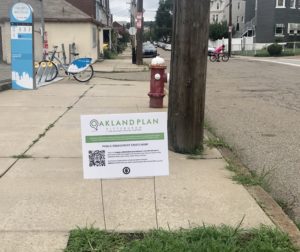The “15-Minute City” is a long-held strategy of urban theorists and designers to improve both living conditions and the environment. Developed at the Sorbonne in Paris, the concept of “la ville du quart d’heure” is one in which daily urban necessities are within a 15-minute reach on foot or by bike. Work, home, shops, entertainment, education, and healthcare — in this urban vision, these should all be available within the same time a commuter might once have waited on a railway platform.
As downtown Pittsburgh’s skyscrapers have emptied, our neighborhoods have become the epicenters of our daily lives. The statistics in Pittsburgh paint a grim portrait of downtown with dozens of restaurants closed in 2020 and a substantial rise in the amount of commercial real estate vacant or available for subleasing. As I started working from home, however, I noticed how many businesses along my neighborhood’s commercial strip were open and providing key services. In addition to our highly essential local coffee shop, we’ve got a handful of restaurants offering takeout and curbside pickup, an acupuncturist, barber, and small grocery. Over 90% of our neighborhood’s commercial space is occupied and thriving.
As the City of Pittsburgh’s Chief Resilience Officer, this trend seemed to me like an important harbinger of economic resilience, so I decided to dig a bit deeper to see if others had noticed the trend and, more importantly, how were we supporting and encouraging it. After all, small businesses make up not only the core of our region’s economy but the heart and soul of our city as well.
I was pleased to learn that keeping our local businesses open and thriving is a concerted effort on the part of a creative and energetic group of individuals and organizations. A prime example: the Open for Business interactive map, produced by Allegheny Together with help by Fourth Economy.
The Open for Business map is patterned after the 2020 Lenten Pittsburgh Fish Fry Map, a creative urban resource designed to promote Pittsburgh’s famous strategy for dealing with the deprivations of Lent. According to Rich Overmoyer, CEO of Fourth Economy, the Fish Fry Map provided the inspiration for the Open for Business Map of Pittsburgh businesses that are staying open during the coronavirus crisis.
“We knew that services like Grubhub and DoorDash only cover a sliver of the businesses that are open and struggling to find a foothold in the online marketplace,” says Rich Overmoyer, CEO of Fourth Economy, who helped organize the effort as part of Allegheny Together. The map grows as small business owners add to it via an easy link and brief questionnaire and users have a simple interactive tool to find out what’s available within walking distance.
Allegheny Together was originally started in 2007 by Allegheny County Economic Development to provide technical assistance and strategic planning for municipalities looking to revitalize their main business districts.
In August, PNC Foundation announced a partnership with the Pittsburgh URA to disseminate $10 million in grant funds to support small businesses, especially those in low-income communities. “Small businesses play a crucial role in our communities and the broader economy, and many are struggling right now,” said Cathy Niederberger, executive vice president of community development banking for PNC. “The pandemic has wreaked havoc on small businesses in general and certain neighborhoods in particular. We believe strongly in bolstering the economic empowerment and vibrancy of our communities and we continue to find opportunities to support small businesses, particularly in underserved neighborhoods.”
As for my family, with two children homeschooling and two working parents, our neighborhood forays for coffee, haircuts, and takeout meals have become a high point of the day. We admire our neighbors’ gardens and pets, meet friends for socially distanced chats and catch up with one another. But there is something much more important happening beyond the social benefits of our newly constrained lives. There is an opportunity to make good on the long-held promise of the 15-minute city and to refocus our efforts on neighborhood revitalization as the cornerstone of resiliency.
To this end, City has adopted the EcoDistricts Protocol as a framework to guide long term neighborhood planning efforts and launched the EngagePGH website – an online tool for citizen participation in neighborhood planning and development, as strategies to encourage greater involvement, more effective planning, and long term investments.
Engage PGH project managers Sophia Robison and Derek Dauphin say that Engage PGH provides a “front door” for citizen involvement, building equity in engagement by allowing those who don’t ordinarily have the time or resources to attend in-person public meetings to participate thoughtfully. Pittsburgh’s approach also quantifies and applies standards for engagement that represent a significant “first” in planning, ensuring that diverse voices are heard. Pittsburgh’s planning process for the Oakland neighborhood has a 34-member advisory committee that helps recruit citizen input.
We are finding that the great reshuffling which is taking place here in Pittsburgh and in cities across the world provides an opportunity to reimagine our cities from the neighborhood up.


Grant, thank you for sharing. I would like to offer another potential building block of the 15-minute City – distributed enterprise centers. This approach to re-engineering our local economies is about demonstrating the a more secure network of strategically distributed tech centers can provide a resilient and equitable way to expand access to employment opportunities. We begin by mapping the knowledge worker labor force and its skillsets to help identify ‘clusters’ of knowledge workers.